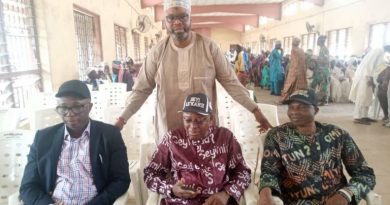UNDERSTANDING CIVILIAN RULE vs DEMOCRACY: A SYNOPSIS
By Azeem Salako
In one of the editions of A SYNOPSIS series, titled; Political ideas: Character, and Nature, I emphasize the inevitable use of political concepts in our daily literacy activities. When preparing reports, writing columns, drafting political manifestoes, conducting interviews, making demands from the government, or trying to evaluate governance, we usually develop certain ideas that we seek to present and articulate. And since our ideas need popular patronage to become effective and authoritative, attempts are made for them to appear simplistic, parsimonious, and inspirational, and to achieve this, we represent our ideas with concepts.
Concepts in themselves are essentially fetish and ambiguous. Although are not without their ingenious meaning but post-modernism which argues operational interpretations of worldviews has aided multiple definitions of concepts with each proposing and legitimating new meanings as though they possess a more logical understanding for monopolistic acceptability. Similarly, concepts are also dichotomous, a concept shares a dim and controversial boundary with at least one other concept i.e.; development vs governance, power vs authority, rule vs regime, etc., etc. There are more troubling ones such as; institution vs organization, colonialism vs colonization, duty vs obligation, nation vs state, anarchy vs anarchism, insurgency vs terrorism, among others.
Notwithstanding their polemics, the expertise and competence of political scientists are needed for the proper demystification of these contentious concepts to situate them in their true perspective before they can be used or become useful for public consumption. The absence of this puts society and its properties at a high risk of vulnerability. In other words, concepts when misused would create or toughen problems, and quite interestingly, these problems require another concept to be explained and solved.
In today’s edition of A SYNOPSIS, I shall be looking at two concepts; Civilian rule vs Democracy, which I have observed have suffered enough mishandling. This misuse is pardonably done in the journalistic space, but more worrisome is seeing them at play amongst some students and practitioners of politics, and yes, by the very nature of their calling, political scientists must protect their professional prestige in ensuring objective, meticulous, empirical, and proper use of concepts.
Let me first announce that these two concepts, Civilian and Democracy systems, represent two different things and this is so notwithstanding how oftentimes and famous they have been (erroneously) used as if they mean the same thing. Their tendencies can as well become opposite to each other.
It is understood that when confronted with the need to use any of these two concepts, neophytes would always consider it unnecessary to separate them. Some even get miffed at political scientists when the latter advised caution using these troubling terms. They are berated as performing a mere academic exercise. Meanwhile, it is the ignorance and neglect of this noble academic exercise that is partly responsible for the developmental crisis in Nigeria, and Africa generally.
Take, for instance, there are some routine characters in a civilian rule that are ostensibly repugnant to democracy, and could constitute the pervasion of a democratic institution. It suffices that the absence of situating a system of rule without observing pedantic can result in giving buoy to misrule, a situation which reflects the Nigeria situation.
Again, the practices of public administrations are essentially conditioned by a type of rule which practically implies that some of the matters that take on the focus of our intellectual and public space today were not necessarily issues during civilian rule while most were complete aberrations under a military regime. For example, the establishment and practices of the Human Rights Commission as a sphere in Nigeria’s public administrations only gained momentum under democratic institutions. It was conceptually and conceivably aberrated under a military regime, its realizability was threatened in civil rule but enjoys prominence in democratic institutions. Still, it brings to the fore what is a civilian rule and what is a democracy, and what explains their relations and differences.
Civilian rule has its root in the writings of modern social contractualism. They were major; Thomas Hobbes, John Locke, and Jean Jacque Rousseau and the foci of their argument not minding the disputations among them is their optic of the state as an invention of man, an abstract entity different from both the ruler and the ruled. The trio equally agreed on the existence of a state of nature, a society where men had lived unfulfilled therefore suggesting a new one that would later be created by men themselves, popularly known as the social contract.
The writings of these three philosophers were necessarily informed by the method of rule within their time and space. It was the period of dynastic monarchy in Europe where power is distributed amongst individuals with royal bloodlines and at a time when a rule is justified based on the divine rights of Kings. The kings who were hereditarily selected were absolute in exercising power and since they were not chosen by men they cannot be held accountable by them.
The writing of contractualism was a complete departure to absolutism and it, in turn, influenced a new type of rule (civilian rule) that would soon sprawl across Europe, and later be forced on, or embraced by the other world. Against this background civilian rule can be understood as a method of government implying the selection of political leaders through the means of election. It marked a clear difference with monarchism which undertook the process of hereditary. As you shall later see, Thomas Hobbes, John Locke, and Rousseau make sense to be called proponents of civilian rule and not necessarily democracy but their writings nonetheless contributed great influence to the rise of democracy.
The core values in civilian rule include election, constitution, accountability, and development. However, democracy is not justified alone with conducting elections to select leaders, neither is it particularly about the constitution nor seeking and probing for accountability. It is also not necessarily about development since every method of rule moves towards building development. The concept of democracy far goes beyond these average accomplishments. It is associated with two precepts; an ideology stating that power belongs to the people, and a principle implying that power is legitimate only when it is exercised through the consent of the people.
The above principle draws thick lines between democracy and civilian rule. This is because, for power to become sufficiently and objectively exercised through the consent of the people, such power must be decentralized – into different levels. It must also be separated – into different arms. And entrusted – in the hands of representatives. The power should as well be used in consent to deliver the demands of the people – governance. And receives feedbacks arising from these deliverables – freedom to hold opinions, with free and unbridled access to political communication channels to hold these views– radio, television, print media, and social media, etc.
Similarly, a civilian rule may in truth share the same leadership recruitment process with democracy, as in elections. However, democracy is more concerned with the credibility of the elections being conducted, and how are these elections are used to subsidize the equal, fair, and justiciable distribution of power amongst diverse people. And even if a constitution is the acceptable legal arbiter in both civilian rule and democracy, the practice of democracy canvasses constitutionalism, as well as the independence of institutions such as – legislature, judiciary, electoral commission, etc., etc.
Although no country can claim to have attained the actual state of democracy. In essence, nations including the world powers are in the process of democratization. Nonetheless, the level of democratization in Africa is pathetic, to say the least. The modest system Africa can boastfully claim to be practicing is a civilian rule – certainly not democracy, and arguably not democratization.
Azeem Salako’s research and academic interest are in Public Sphere and Citizenship in Africa. He can be reached through casoglobe.edu@gmail.com



